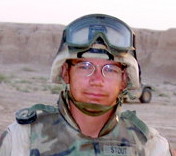|

|
Letter
to the Editor
Landmines,
an equal opportunity killer
by
Robert
Stout
Combat Engineer |
“Landmines, an equal opportunity
killer.” The first time I heard that
phrase was in October of 2000 while I was attending
Combat Engineer Advanced
Individual Training. During the entire course
the fact that military
ordnance does not care who you are was drilled into
our minds. Sadly, the
policy of “Don’t Ask Don’t Tell” is not as
accommodating as a steel case
containing explosives.
According to a news article by the Associated Press,
the need for the
military’s explosive ordnance disposal (EOD) techs
is at an all-time high.
Sadly, I saw this issue first hand over three
years ago while I was
serving in Iraq. The lack of EOD techs to
destroy every type of munitions
and explosive imaginable has led to combat engineers
being tasked to perform that duty as part of their normal mission. As the only
other Army specialists who work with
explosives on a regular basis we were picked to fill
in the gaps for EOD work.
Explosives
removal was a completely different task for Combat
Engineers. The training we had received from Basic Training and the continued
education had to be
reworked. For the entire duration of my military
career I was trained to
emplace landmines, use explosives to blow holes in
roads and cut down trees,
and build barbed-wire obstacles. The closest we
came to the EOD techs was our
use of explosives to destroy enemy obstacles or
landmines. But we pulled it
off.
Soon into my tour in Iraq. we received news that we would now
have two EOD techs
working with us. A collective sigh of relief was
felt throughout the platoon. Our use of and training with explosives
had given us a starting
point but the experience of the techs in removing all
manner of ordnance
could not be matched. With their help we
successfully identified and
destroyed over 120 improvised explosive devises during
our year-long tour,
without a single person lost.
And yet, some of us where not good enough in another
respect. We
could risk our lives placing
a blasting cap in a block of C4 under the threat of
ambush but could not
talk about whom we left back home. I can say that
those people driving the
routes in Iraq and Afghanistan are grateful for the
work we did. I find it
very hard to imagine that any private, sergeant,
lieutenant or colonel who
has driven those routes has ever sat awake at night
worrying if one person in
a IED clearing team was a homosexual. And yet,
the Pentagon does worry.
In the past couple years I have read numerous stories
like the one citing a shortage of explosive ordnance disposal (EOD) techs
. It seems that every couple months there is
a new military job title that is understaffed. Even after lowering
admission standards, our military
is unable to keep the needed numbers. And still
we force people out of the
military through archaic laws. We keep hearing
about the number of
personnel discharged under DADT, but what is the real
number? We forget
about those that left voluntarily because of it.
Just sitting here I can
think of at least five people in my battalion alone
that left the Army at
the end of their contracts. They are not
included in the DADT numbers and
they are forgotten and uncounted because of that.
The real cost of the military’s DADT policy can
never be known. How many
people could have been saved by having more EOD techs?
We are willing to
jeopardize our mission and even our soldiers' lives
for this policy. That
is too high a cost. Our brave men and women who are out fighting in
Iraq and Afghanistan are not concerned about DADT,
they are concerned about
making it home. The only people in the military
who are concerned are
those of whom I have never heard about being understaffed
and those who never
have to worry about coming home. The only convoy
they have to worry about
is the rush hour traffic at the Pentagon.
©
2008 Gay Military Signal
|